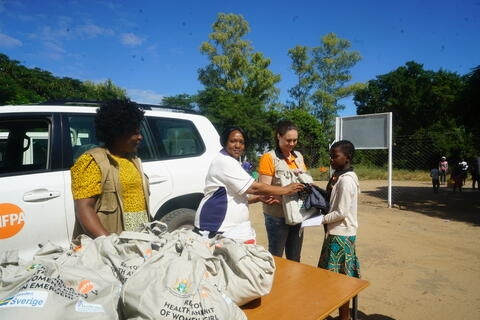Harare, Zimbabwe, 11 September, 2018 – Considering the impact of Gender Based Violence (GBV) is essential when preparing for disasters and emergencies, gender experts attending a workshop on how best to respond to GBV in emergencies have said.
The experts were speaking at a capacity building workshop held recently on GBV in Emergencies preparedness and response across Zimbabwe, organised by the United Nations Population Fund (UNFPA) ion partnership with the Ministry of Women Affairs, Gender and Community Development (MOWAGCD). The workshop was attended by over 60 participants from all over Zimbabwe, representing civil society organizations who are at the forefront in the fight against GBV, which remains a serious challenge in the country.
Evidence from the 2015 Zimbabwe Demographic and Health Survey shows that GBV remains a serious challenge in the country. The overall prevalence rate of GBV is at 35% with 14% of women aged 15-49 reported having experienced sexual violence while 25% reported experiencing physical violence since the age 15. In addition, 45% of ever married women reported experiencing physical, sexual and emotional violence by their current or most recent partner.
Vulnerability to GBV becomes even more pronounced in the context of an emergency. Zimbabwe, as in many countries in East and Southern Africa, has been experiencing a number of hazards in the past few years including the 2008 cholera outbreak, where 98,596 cases and 4 369 deaths were reported. Zimbabwe also experienced other emergencies such as the 2016-2017 drought crisis due to the El Nino effect, which effected up to 5.2 million people in the country, and the La Nina induced floods of 2017, which left an estimated 100 000 people without access to safe drinking water and disrupted the schooling of 166,216 children.
Multi-hazard situations such as these have not only led to yearly bouts of food insecurity, water shortages, loss of income/livelihoods and health concerns but have exacerbated overarching protection concerns. The most vulnerable are exposed to a host of GBV related risks, including physical violence and sexual abuse, as well as often being forced to adopt negative coping strategies (transactional sex, early marriage, accepting unsafe living situations etc.) to meet their most basic needs. These vulnerable people may also experience additional challenges in accessing the necessary support services after they have been exposed to these forms of GBV.
During the workshop, participants were actively engaged in discussions about how best to incorporate issues of GBV into the preparations for disasters and emergencies, as well as in the post-disaster responses after has occurred. The workshop constituted an interactive opportunity to learn about GBV programming in emergencies. Participants were initially taken through the phases of an emergency scenario planning on the basis of the existing in country situation, and taken through the process of GBV preparedness. This included the development and dissemination of early warning systems that can be implemented to alert people of oncoming emergencies.
Information was also shared on key tools for carrying out preliminary and rapid assessments, which can be carried out in the immediate wake of emergencies to establish service availability and identify increasing vulnerabilities and needs. The workshop focused on communications skills to communicate about GBV prevention, mitigation and response, with a specific focus on dissemination of information on GBV referral pathways, and the role of GBV specialized vs non specialized actors in applying a survivor-centered approach.
An overview of the Minimum standards for prevention and response to GBV in emergencies was provided to all participants, with the aim of highlighting roles and responsibilities of specialized GBV service providers, while a session on the IASC guidelines on integrating GBV interventions in humanitarian action provided the participants with an understanding of the importance of coordination between specialized and non-specialized GBV actors on the ground. The two-day event was concluded with a session on PSEA, in order to sensitize attendees on the standards of practice to prevent sexual exploitation and abuse of programme beneficiaries by humanitarian staff themselves.
“Learning about GBV in Emergencies has equipped us with broader strategies that will enable us to support GBV survivors who have been neglected during emergencies,” said Nyasha Mazango Programme Officer with Msasa. “From today we are going to consider the effect of emergencies on different people, especially women and responsive mechanisms which will still promote women’s rights safety and security”
Speaking at the close of the workshop UNFPA GBV Coordinator Verena Bruno said it was pleasing to note that by the close of the workshop, participants had gained a better understanding of the increased risks associated with GBV during and after an emergency and concrete steps that can be taken to mitigate those risks. Each participant was provided with key tools for the development of a preparedness plan, which will be supported at the country-level by UNFPA and the MWAGCD in its implementation and results.
“As partners working on the ground in the prevention and response of Gender Based Violence it is important to be equipped with the right information and tools on how best to do this,” said Bruno. “I hope as partners the information acquired at this capacity building workshop will make a difference in the lives of women and girls and help us better respond to their needs.”
By Eolann MacFadden


